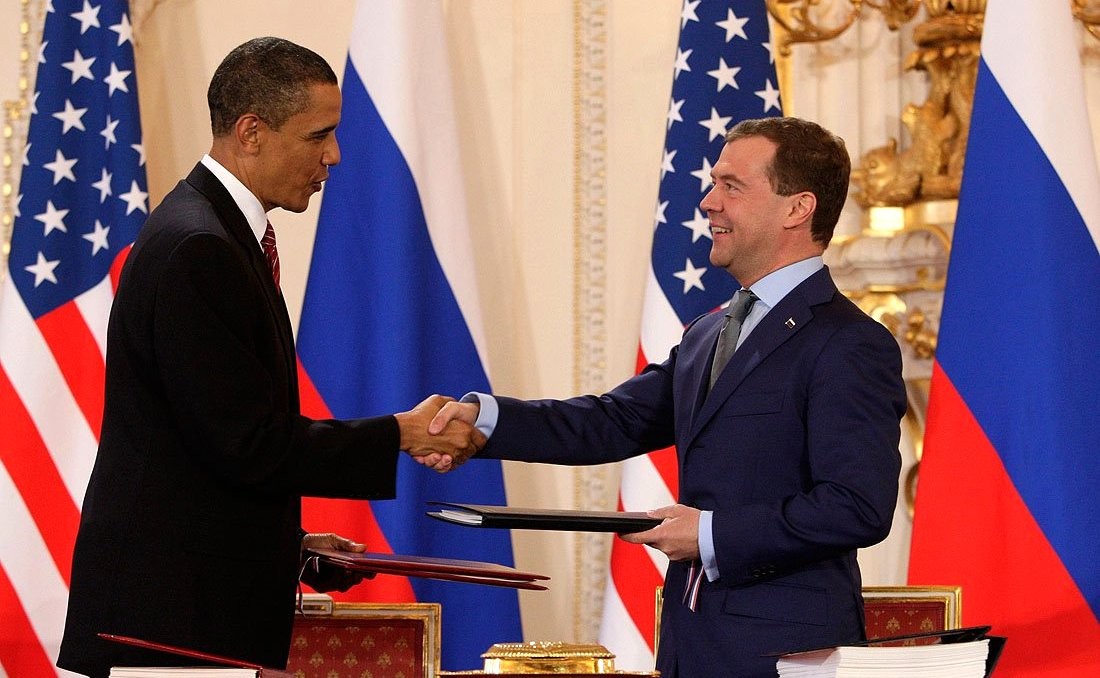
Most pressingly, the fate of New START hangs in the balance. In September, after debate in the Senate Foreign Relations Committee (remember, the Senate deals with ratifying treaties), the treaty got at least a modicum of bipartisan support. All of the Democrats voted in favor, and Senators Richard Lugar (R-IN), Bob Corker (R-TN), and Johnny Isakson (R-GA) joined them. Perhaps as an early indicator of Tea Party foreign policy, South Carolina's Jim DeMint (who had tried to work in some language about missile defense) did not show up to vote. Anyway, because of the GOP support, the treaty made it out committee for open debate on the Senate floor.
The issue now is, when will that happen? Clearly the Democrats would like the vote during the lame duck session, while Corker wants the vote pushed until early next year so that the new Senate can have a say. The Dems are already plying moderate Republicans like Olympia Snowe for support, though without Corker it is likely that the vote will be pushed until new session, where its fate is uncertain. Certainly, the Russian Duma has backed down on its support, assuming that the GOP will not allow New START to pass. The efforts of the conservative think tank the Heritage Foundation certainly aren't helping that impression; the organization is already sending out mailers to moderate Republicans and conservative Democrats to pressure them into voting against the treaty. The mailings denounce Corker for collaboration, juxtapose Obama's face with those of Ahmadinejad and Putin, and warn that passing the treaty will weaken our national defense.
Now this is a rather facile analysis. Heritage's linking of Obama to Putin and Ahmadinejad is that same simplistic bait-and-switch tactic used by both sides to link the other to "sending jobs to China" ahead of the midterms. One would hope that what ever a politician's leanings on the issue, such a facile approach would hold little weight. But, given the money and clout of lobbying firms, of which Heritage is one of the largest, that isn't a given.
Further, though Corker's argument that it is more democratic to wait for the newly elected Senate to deal with the issue sounds appealing, it falls flat--especially on this issue. First, the current lame duck session of Congress was not elected in some sort of vacuum--they remain our nation's elected representatives, for better or for worse. It seems that Corker is already feeling heat from more conservative comrades and is seeking to punt the issue to the next session so that the bill's defeat will "absolve" him of voting for it in committee. Furthermore, this new Congress was more or less voted in as a mandate on the economy (as we discussed in class last week, foreign policy often takes a backseat). Second, there is a precedent of lame duck Congresses passing major legislation, such as the Clean Air Act and accession to the GATT.
Finally, the issue of nuclear weapons is somewhat unique, especially when a major decision on the issue requires cooperation with another country. The ratification of a treaty requires quick, decisive action. This does not mean that proper consideration and debate can be eschewed, but lagging on the issue equates to a de facto veto. Obama and Medvedev signed the treaty in April, so the clock has already been ticking for about seven months. As the Russian Duma's repeal of its recommendation for ratification after the midterms shows, long delays will effectively kill a treaty. The Senate must realize that time is of the essence. Charges by the Heritage Foundation and others that this threatens our national security do not understand the issues at stake in the treaty, America's military dominance--both conventional and nuclear, and the nature of nuclear deterrence itself. They merely obscure the issues, and allowing more time to pass threatens the likelihood of the Russians playing ball while simultaneously allowing such threat-inflating flame-baiting to take hold. A treaty is not a normal peace of legislation, and should be held above political horse-trading, especially when it only requires a reduction of America's bloated, over-priced nuclear forces in exchange for a reduction in kind.
This issue is relevant not only for its national security considerations, but because of how it fits with this week's course readings. In particular, the White House's National Security Strategy puts a great emphasis on the President's desire to reduce the nuclear weapons in the world, while maintaining a strong nuclear deterrent for as long as they exist. The Senate has a capability to blow a hole in these goals and mortally wound one of Obama's major political goals.
I do not mean to suggest that they should not kill these goals because it is politically cruel, or because Obama is who he is. It would simply be wrong to not curtail the threat of accidental nuclear warfare or that poorly maintained Russian nuclear materials could fall into the hands of terrorists, simply to score political points against the President's agenda. How the Senate deals with New START will thus not only reflect the body's foreign policy leanings, but will be an early indicator of whether it will be a force in creating gridlock for the next two years at the expense of behaving responsibly. No matter what issues or positions you hold most important: from nuclear weapons to debt reduction to immigration, that is not something the US can afford.
No comments:
Post a Comment